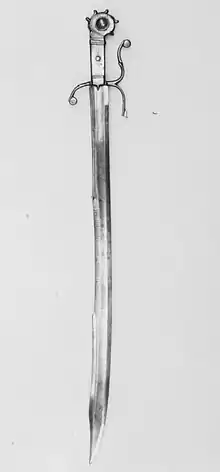falchion
See also: Falchion
English

A falchion.
Alternative forms
Variant spellings[1]
- fachon (14th-17th century)
- fachone (14th-17th century)
- fachoun (14th-17th century)
- fauchon (14th-17th century)
- fauchone (14th-17th century)
- fauchoun (14th-17th century)
- fawchon (14th-17th century)
- fawchone (14th-17th century)
- fawchoun (14th-17th century)
- fauschune (15th century)
- fawchun (15th century)
- fawken (15th century, erroneous, conflating falcon)
- fouchon (15th century)
- fwalchon (15th century)
- fachen (16th century)
- falcheon (16th century)
- faucheon (16th-19th century)
- fauchin (16th-17th century)
- fauchine (16th-17th century)
- fauchion (16th-19th century)
- faulcheon (16th-19th century)
- faulchion (16th-19th century)
- fawcheon (16th-19th century)
- fawchin (16th-17th century)
- fawchine (16th-17th century)
- fawchion (16th-19th century)
- falcen (17th century, erroneous, conflating falcon)
- falchon (17th century)
- faulchin (18th century)
Etymology
From Middle English fauchoun, from Old French fauchon (cognate with Italian falcione), from Vulgar Latin *falciōnem, from Latin falx.
Pronunciation
- (Received Pronunciation) enPR: fôlʹshən, IPA(key): /ˈfɔːlʃən/,[1]
- (US) IPA(key): /ˈfɔlt͡ʃən/
- (cot-caught merger) IPA(key): /ˈfɑlt͡ʃən/
Noun
falchion (plural falchions)
- (also attributively) A somewhat curved, single-edged medieval sword of European origin, with the cutting edge on its convex side, whose design is reminiscent of the Persian scimitar and the Chinese dao.[1]
- c. 1603–1606, William Shakespeare, “The Tragedie of King Lear”, in Mr. William Shakespeares Comedies, Histories, & Tragedies […] (First Folio), London: […] Isaac Iaggard, and Ed[ward] Blount, published 1623, →OCLC, [Act V, scene iii], page 309:
- I haue seene the day, with my good biting Faulchion
- 1607, [Barnabe Barnes], The Divils Charter: A Tragædie Conteining the Life and Death of Pope Alexander the Sixt. […], London: Printed by G[eorge] E[ld] for Iohn Wright, […], →OCLC, Act III, scene ii:
- Thy Chamber with Ambroſiall odors breatheth, / New loues and true loues vnto them that entreateth, / And furious Mars made milde his Faulcheon ſheatheth / At thy delicious aſpect: [...]
- 1819 December 20 (indicated as 1820), Walter Scott, chapter X, in Ivanhoe; a Romance. […], volume III, Edinburgh: […] Archibald Constable and Co.; London: Hurst, Robinson, and Co. […], →OCLC, page 242:
- The Jester wore his usual fantastic habit, but late accidents had led him to adopt a good cutting falchion, instead of his wooden sword, with a targe to match it; [...]
- (obsolete)[1] A billhook.[1]
Derived terms
- case of falchions (swordplay)
- double falchion (swordplay)
- falchioned (armed with a falchion)
- single falchion (swordplay)
Translations
Verb
falchion (third-person singular simple present falchions, present participle falchioning, simple past and past participle falchioned)
Derived terms
- falchioned (slain by a falchion)
References
- “falchion, n.” listed in the Oxford English Dictionary, second edition (1989)
- “†ˈfalchion, v.” listed in the Oxford English Dictionary, second edition (1989)
This article is issued from Wiktionary. The text is licensed under Creative Commons - Attribution - Sharealike. Additional terms may apply for the media files.